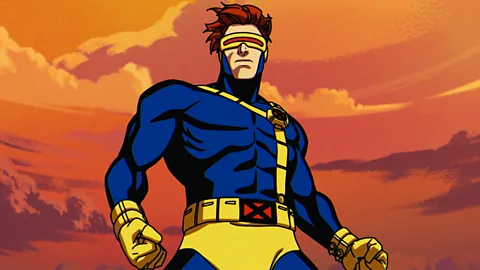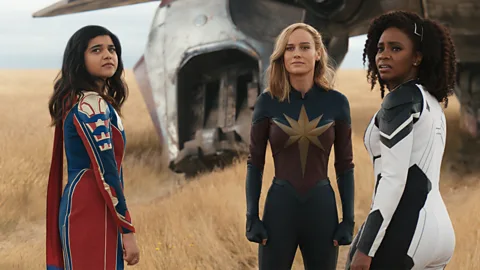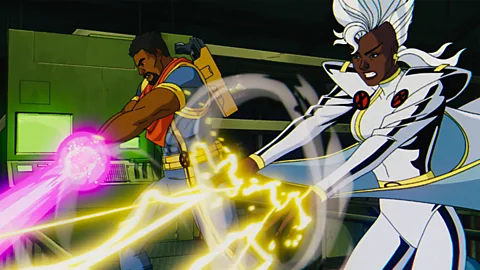X-Men '97: Why the series' blend of nostalgia and originality is just what Marvel needs right now
 Disney
DisneyMarvel's relaunch of the X-Men animated series signals a shift after many franchise missteps.
This story contains minor spoilers for the first two episodes of X-Men '97.
As a revamped rendition of Ron Wasserman's iconic X-Men synth riff plays over the opening title sequence of X-Men '97, accompanied by flat, bright 2D animation, today's superhero-weary audience is reintroduced to a comforting familiarity. In its opening minute alone, Marvel begins its delicate balancing act: bringing a mix of nostalgia and new life to a fan-favourite series. It's a balance that has struck a chord with Marvel fans, both loyal and new.
The redux picks up where the original – X-Men: The Animated Series – left off. In the wake of the death of Professor Charles Xavier, founder of the eponymous superhero team, the remaining X-Men, including Cyclops (Ray Chase), Jean Grey (Jennifer Hale), Wolverine (Cal Dodd), Rogue (Lenore Zann), Storm (Alison Sealy-Smith) and Beast (George Buza) are left to pick up the pieces, in a world prejudiced against and hostile toward mutants.
The original animated series ran from 1992 to 1997 and is now heralded as a classic for 90s kids. When the 2024 series was first announced in 2021 it looked as though Marvel was aiming to recapture that core audience while folding the franchise into its existing IP for new and younger fans (The X-Men franchise was previously owned by Twentieth Century Fox, but was sold to Disney in a major deal back in 2017).
"We've had a series of Marvel movies and television that featured new characters or spun-off characters who had very little originality or depth to them," box office analyst David A Gross tells the BBC. "Any new Marvel film – X-Men or anything else – is going to have to navigate those challenges."
So in a media landscape riddled with reboots, revivals and adaptations, why should an animated series continuing a story about eccentric characters from 30 years ago draw acclaim?
The nostalgia factor frees the series from the Marvel Cinematic Universe's hefty canon
The danger of relying on nostalgia when building the foundations of a television show or film is that leaning too hard into it can cheapen the point of the story, as well as all of the elements that go hand-in-hand with crafting something separate and distinct. Nostalgia, used too liberally, can push characters or stories into familiar tropes or story beats, as it does with the latest Indiana Jones film, or can come off as gimmicky, as it does with the live-action remake/adaptation of Avatar: The Last Airbender.
But a healthy dose of nostalgia can be a good thing, as is the case of this old-new X-Men. On the technical side, X-Men '97 uses modern animation technology to give a smoother, visually bold update to The Animated Series' comic book style – bright colours and choppy movement – which was artistically reminiscent of shows such as GI Joe and the animated Transformers series from the 1980s. It also helps to see voice actors from the original series – including Dodd, Zann, Sealy-Smith and Buza – reprising their roles this go-around with little change in their vocal performance. X-Men '97 manages to use nostalgia as a buy-in for the audience to settle into this new iteration of the story.
 Disney
DisneyMarvel has been struggling to hit its mark with recent superhero iterations. The Eternals (2021) had the challenge of telling a good origin story while explaining new universe lore, as well as introducing 10 new main characters in the span of one film. The Marvels (2023) brought together characters from Captain Marvel, Ms Marvel and Wandavision in a move that required the audience to have watched at least one film and two full TV series to understand the characters' backgrounds. In a universe that spans 33 films, 11 television series on Disney+ and one-off specials, context can be both important and daunting.
But in the first two episodes of X-Men '97, it is clear the story doesn't rely too much on viewers knowing exactly what happened in the original five seasons. Much like the original show's pilot, '97's first episode has a young mutant (Roberto de Costa, played by Gui Agustini) kidnapped by anti-mutant thugs, who is introduced to the X-Men via expository explanations and serves as the audience's way into the world. The show also relies on the general pop cultural awareness of the X-Men, aided by 30 years of comic books, cartoons and live action films to fill in any remaining knowledge gaps.
"There are a lot of elements that Disney and Marvel emphasised for their revival – returning voice actors, holding true to animation techniques of the period and that iconic theme song," says film and television critic and journalist Max Covill. "But beyond all that, it's inherently satisfying to watch these memorable characters interacting with one another again."
By the second episode, having addressed an intricate, existing history and context for newer audiences, writers focus on breaking new storytelling ground, digging deeper into developing these characters – such as the evolving complexity of villain-turned-leader Magneto – further.
 Disney
Disney"It speaks volumes that the best moments from X-Men '97 aren't the frenetic action sequences but the interpersonal moments, like Jean Grey and Storm sharing their fears for the future," Covill adds. "This is the heart of the X-Men and why this show works so well."
The series continues to tackle themes of diversity, prejudice and belonging that made the original beloved, and make the series especially prescient today.
With X-Men '97, Marvel adopts a new nostalgia-backed strategy
Marvel Studios President Kevin Feige emerged from the blockbuster success of Avengers: Endgame with a prevailing thought: The Marvel Cinematic Universe (MCU) needs to expand, and to do so, the studio needs to release more content. In an interview with Variety in 2021, Feige was ecstatic to begin building out not only an expansive universe, but a more diverse one, focusing on lesser-known superheroes across MCU's film and television slates. Since then, audiences have been introduced to characters such as Shang-Chi, Ms Marvel and Echo, all lesser-known heroes compared to the likes of Spider-Man, Iron Man or Captain America.
By the end of 2023, one thing was certain: Feige's plan wasn't working. Production and release schedules had been packed (nine MCU projects were released in 2021, and nine in 2022), partially due to former Disney CEO Bob Chapek's push for an endless stream of MCU projects in theatres and on Disney+. The Marvels had the lowest grossing opening weekend of the MCU, taking just became the MCU's lowest grossing box office opener, making just $47m (£38m) in the opening weekend. Ant-Man and the Wasp: Quantumania, which grossed $214m (£169m), became the MCU's worst-reviewed film with a score of 46% on review aggregator Rotten Tomatoes. Poor box office performance and mixed reception were chalked up to "superhero fatigue".
"Superhero fatigue may be real, but Marvel's specific contribution to it was a relentless release schedule that turned moderate fandom into homework," says J.D. Connor, an associate professor of Cinema and Media Studies at USC. "At the same time, Disney's Marvel needed to integrate the very popular X-Men, who had been all but ground to dust at Fox."
As of March 2024, the Marvel Cinematic Universe had amounted to a whopping 7,615 minutes (126.9 hours) of content – a herculean task for even the most dedicated of viewers. The threshold for entry into the MCU was getting higher and more untenable, and so Marvel pushed any tie-in references to the greater universe into one-liners or mid- and post-credits scenes. The MCU was feeling more isolated than ever, without a clear, overarching element tying the disparate story threads together. The interconnectedness seen in the last two Avengers films felt more like a distant memory, and its absence was telling.
More like this:
So, Feige and Marvel announced they had begun to pivot. There would only be one Marvel film releasing in 2024 – the highly-anticipated Deadpool and Wolverine. The studio would also refocus on bringing back legacy characters, such as the X-Men and the Fantastic Four. And on the television side, following the success of the animated series What If?, Marvel would expand on animated series, including X-Men '97. This X-Men universe, like What If? is also canonically separate from the events in the main MCU, freeing it from any baggage set up by over ten years of Marvel content.
"I think the solution is strategically sharp: make a relatively low-cost, 'Saturday morning cartoon' that can play to fans' nostalgia without raising daunting questions about how much prep you need to do to 'get it'," Connor adds.
This new blueprint for tackling legacy property looks to be working in Marvel's favour, with a 98% critics score and 92% audience score on Rotten Tomatoes. It's a strategy that could prove fruitful for Marvel's upcoming legacy animation and live-action projects, like the upcoming Your Friendly Neighborhood Spider-Man and its new Daredevil series. But, with the unexpected departure of X-Men '97 writer-producer Beau DeMayo, who was instrumental in launching this current iteration of the X-Men's story, it is unclear if the show will continue its stride indefinitely.
Marvel still has to figure out how to maintain its ever-growing catalogue – that and how to keep stories fresh and exciting for both seasoned and future audiences. Whether that means a continual investment in legacy characters or just longer breaks between Marvel flicks is anyone's guess. But for now, fervent 90s kids can rest easy knowing their beloved X-Men series' latest mutation is a winning one.
The first two episodes of X-Men '97 are streaming on Disney+ now.
--
If you liked this story, sign up for The Essential List newsletter – a handpicked selection of features, videos and can't-miss news delivered to your inbox every Friday.
